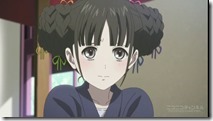 |
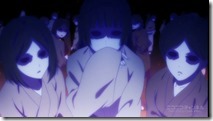 |
 |
RDG presents a pretty unique set of issues for a blogger.
There was a little delay in Red Data Girl’s web stream making its way to the usual places in subbed format this episode, and that made the decision to keep blogging that version even tougher than usual. At this point the gap is down to a week, and it’s sore tempting to wait – but in for a penny, in for a pound as the Brits say. I’ve come this far blogging the series as soon as its available and this close to the finish line, I may as well see it through to the end.
As I’ve been watching and blogging RDG, I’ve been following viewer reaction both among those following this path and those waiting for the HD releases, which have been about two weeks behind through the first 8 episodes. It’s been fascinating, because I see a lot of criticisms of the series in that latter group, and they’re ones I feel as if I could easily refute if I wanted to, knowing what I know now. But it raises an interesting question – would the same be true if we were to go back and watch any anime with mystery themes a second time, two weeks after the first – would that which first-time viewers see as flaws strike one as unfair criticisms? Or is the case that the series isn’t doing a good enough job making itself approachable, because you shouldn’t have to watch a second time for everything to make sense?
In any event, what seems clear to me with RDG is that the answers are almost always there, they’re just hardly ever there at the time the questions are posed. Whether this is a defect or not depends on your perspective, but as you know if you’ve been reading my posts I like this show very much on first viewing, and that includes the air of mystery that surrounds it. It’s a series where the characters themselves don’t understand what they’re dealing with a good deal of the time, and forces greater than they are continually play havoc with their lives. For a series completely immersed in the mythology of Shinto and Shugendou that seems entirely fitting, even if occasionally frustrating (both for the audience and the cast).
One fascinating thing Red Data Girl does is that it seems to stagger the ends of one episode and the beginning of the next – it’s as if we start each week walking in on the middle of something that happened off-screen. This is a device a few classic comic strips use to great effect (Doonesbury and Bloom County foremost) but it’s rarely this apparent in episodic television. I think it is a stylistic choice – whether it parallels the novels I can’t say, but it may be another consequence of this huge story being compacted into 12 episodes. Episode 10 is a glaring example – it starts with a conversation between a distraught Izumiko and Mayura, with Izumiko dismayed about being “an enemy of mankind” and describing events so terrifying that even Miyuki-kun was frightened. Not for the first time with RDG I did a double-take, wondering if we’d skipped a scene somewhere, before realizing this was simply a matter of Izumiko’s memory taking a while to catch up to events that happened while she was possessed by the Goddess. But at no point is this spelled out for us – you just have to connect the dots, and it makes sense. It’s certainly an unusual narrative approach and it’s clearly not pleasing everyone, but it’s generally working for me.
Once we settle into the episode the focus is on the school Sengoku Festival, which we know is shaping up as a grand battle between Mayura and Takayanagi. The latter is clearly up to something with his class’ haunted house depicting the ruins of Hachijouji Castle (see my post on episode 9 for more – as expected, the series expects the audience to know the history of the place) – girls are falling sick after visiting. Sagara volunteers to investigate (Kisaragi-Kaichou is weak with ghosts) and, despite his warnings, Izumiko wanders inside. There she sees visions, apparently of the ghosts of the victims of the massacre, and is apparently followed by some sort of spirit in the form of a vaporous cloud. That there’s something amiss on campus is confirmed by Masumi, who shows up unannounced and uninvited in Mayura and Izumiko’s dorm room and declares that he senses magic on campus, though he could “kick its ass” if he wanted.
In a story full of mysteries, Masumi remains one of the biggest unknowns, a real randomizing element. How much self-awareness does he have – does he understand his true nature and see his existence as an affectionate joke on Mayura and Manatsu, or does he truly believe he’s their dead brother’s spirit? He represents the capricious nature of the spirit world beautifully – there was always a lurking sense of danger to him, even before his true nature was revealed. It’s hard to hear him speaking of eating the spirits he sees wandering the Earth out of love for them and not worry for Izumiko, given that he’s already expressed a bit too much interest in her. Masumi senses her power, surely, and he’s to be heard from before this drama at the festival has played out.
Apart from that, this appears to be mainly a setup episode, with the big events starting in episode 11. That cameo by Miyano Mamoru as Hayakawa turned out to be a bit more, as he ends up being important – as the head of the Festival Committee, he’s acting as Mayrua’s father’s agent, and he manipulates it so that she and Takayanagi are commanding the opposing forces at the re-enactment of the siege of Hachijouji Castle, he the attackers and she the defenders (it’s worth noting that in real-life the defenders were outnumbered 40-1, and died to the last man, woman and child). Yukimasa continues to torment Miyuki, though the son claims he understands the “ulterior motive” behind it. Any way you slice it Yukimasa is an unpleasant and entirely unlikeable man in addition to being a terrible father, which leads me to doubt his motives when it comes to the Goddess. Playing on Miyuki’s mind is the worry – based on the Goddess’ story of her travels in time – that she and Izumiko might be the same person, and these certainly aren’t lessened when Izumiko parrots the Goddess’ words and says she doesn’t like Sagara talking about other women. It seems clear that the level of familiarity between those two is reaching new heights, though their bond is surely going to severely tested by the events of the last two episodes. I can hardly begin to imagine what P.A. Works has planned – rarely can I recall a story that seemed so incomplete with only two episodes remaining to tell it.
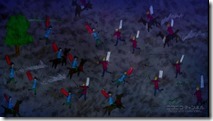 |
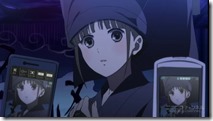 |
 |
 |
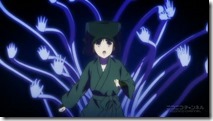 |
 |
 |
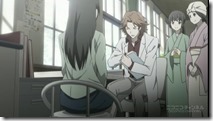 |
 |
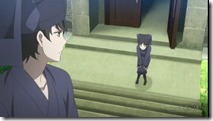 |
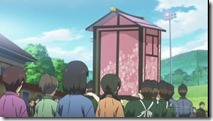 |
 |
 |
 |
 |


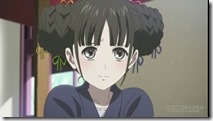
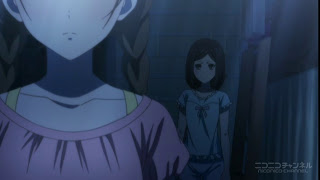
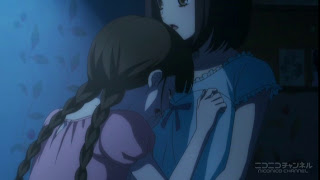
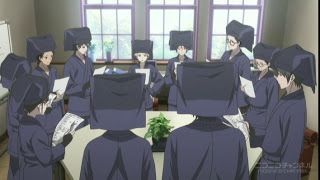
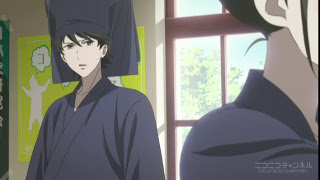
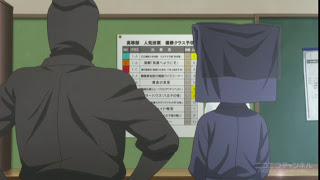
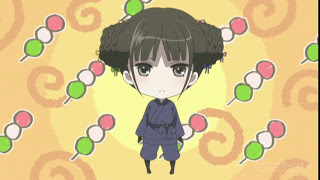
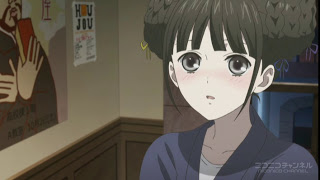
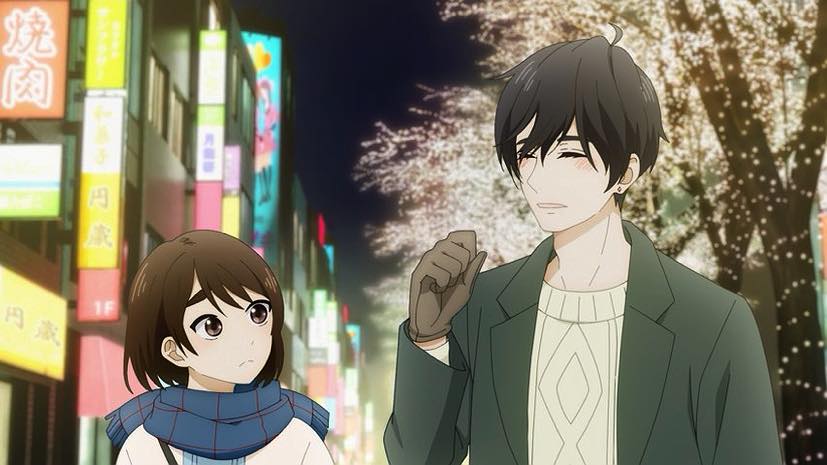
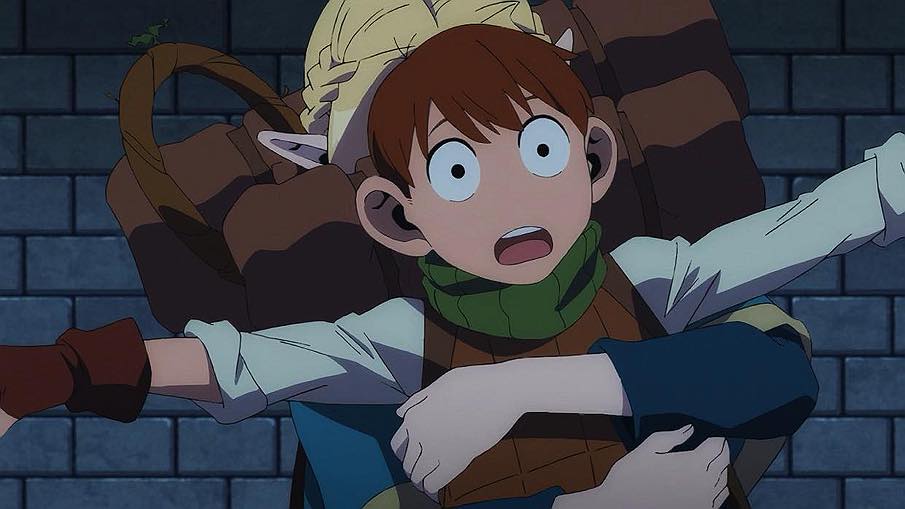
Ronbb
May 27, 2013 at 11:00 pmI think you are quite right. A premise based on Shinto/Shugendou mythology may not be as popular to begin with, but it's really its narrative style that has made people lose interest in the show. I can see the potential issues that you pointed out way back when the show started and am worried that — with only 2 episodes left — RDG may end with quite a number of unanswered questions. I am a sucker for characters and can get blindsided when I like them. I guess RDG is an example as I like Izumiko and some of the character interactions. I like the story a lot but feel that some of its potentials are lost — being a one-cour doesn't help. I hope that at least the last two episodes will wrap up a few threads or give us insights into how the story will go.
r3dking
May 28, 2013 at 5:20 amI don't think the problem is narrative style per se. The issue is that so much of what's happening is shown in passing _and then never explained_. I'm fine with the 'in passing' part, but never going back to fill in the details is major flaw. I can totally believe that this is due to trimming the material to the bare bone to make it fit in 12 (13?) episodes, but that that doesn't make it any less of a flaw. It's a pity because I really like the premise, the art, and the plot so far as I can follow it. It's true that I don't have the background in Shugendou to catch hints that may be offered, but I suspect that it would take not only that but a prior familiarity with the source material to fully appreciate the anime version. The next episode (11) introduces yet more major plot developments but still doesn't explain or resolve much of anything. So I see little hope for a tidy package by the time the season ends.
All of this reminds me a lot of "Nishi no Yoki Majou: Astraea Testament". I loved the setting and the story, but could not follow the plot _at all_ until I hunted down a written version of the source. After that I went back and enjoyed the anime much more.
kuromitsu
May 28, 2013 at 12:07 pmI think those criticisms are partly the result of subjective viewer attitudes and expectations. RDG is not the only show to receive them – just from the shows I watched recently, people said the same things about Shinsekai yori, and K (which was, unlike RDG and SSY, an original story, and a glorified whodunit at that). Too many questions, no explanations, this makes no sense, what crappy writing, etc.
I guess people have different expectations when going into a story: some people seem to prefer having the most plot information at any given time, and are frustrated when they feel they're left in the dark for no reason. Others (like me) don't mind being in the dark, as long as the questions are eventually answered. I think that in shows like RDG the plot tension comes from heaping up questions and mysteries and slowly revealing the details/answers, so I trust that the important things will be eventually explained.
That said, I still think that some people make RDG out to be more confusing than it actually is. Some things I've seen people complaining about were either explained in the anime, or there were enough clues that the viewer could deduce the answer on their own. So I think the other part of the issue is what someone at the AS forum said: being a 12 episode adaptation of a 6 book series, the pacing has become relatively fast in the sense that it tends not to spend a lot of time on individual scenes so there's less time for details to sink in while watching.
.Lime
May 28, 2013 at 3:18 pmWhat sort of costumes are Izumiko, Miyuki and the student council wearing for the festival? Are they some kind of ninja outfit? Is there some king of cultural connotation?
admin
May 29, 2013 at 12:06 amI believe those are more or less the generic clothing that Sengoku era castle residents (low-level Daimyo, probably) would wear in daily life.
Gwen
May 29, 2013 at 5:25 amMy Japan-acquainted boyfriend said they were stagehand outfits, I assume from one or the other of Japan's assorted theatre traditions.
kuromitsu
May 29, 2013 at 9:47 amYes, they're cosplaying kuroko.
r3dking
May 29, 2013 at 3:10 pmSo they're the puppeteers who are in the background moving all the other player/puppets around on stage. Clever.